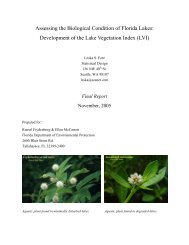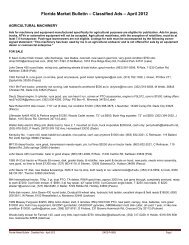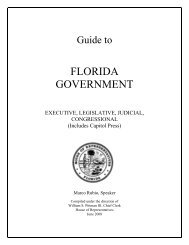Version A final setup - Florida House of Representatives
Version A final setup - Florida House of Representatives
Version A final setup - Florida House of Representatives
Create successful ePaper yourself
Turn your PDF publications into a flip-book with our unique Google optimized e-Paper software.
e informed <strong>of</strong> the nature and cause <strong>of</strong> the accusation; to be<br />
confronted with the witnesses against him; to have compulsory<br />
process for obtaining witnesses in his favor, and to have the<br />
assistance <strong>of</strong> counsel for his defence.<br />
ARTICLE [VII.]<br />
In Suits at common law, where the value in controversy shall<br />
exceed twenty dollars, the right <strong>of</strong> trial by jury shall be preserved,<br />
and no fact tried by a jury, shall be otherwise re-examined in<br />
any Court <strong>of</strong> the United States, then according to the rules <strong>of</strong><br />
the common law.<br />
ARTICLE [VIII.]<br />
Excessive bail shall not be required, nor excessive fines<br />
imposed, nor cruel and unusual punishments inflicted.<br />
ARTICLE [IX.]<br />
The enumeration in the Constitution, <strong>of</strong> certain rights, shall<br />
not be construed to deny or disparage others retained by the<br />
people.<br />
ARTICLE [X.]<br />
The powers not delegated to the United States by the<br />
Constitution, nor prohibited by it to the States, are reserved to<br />
the States respectively, or to the people.<br />
[ARTICLE XI.] 8<br />
The Judicial power <strong>of</strong> the United States shall not be construed<br />
to extend to any suit in law or equity, commenced or prosecuted<br />
against one <strong>of</strong> the United States by Citizens <strong>of</strong> another State, or<br />
by Citizens or Subjects <strong>of</strong> any Foreign State.<br />
8Note.—This amendment was proposed by Congress on March 4, 1794;<br />
ratification was completed on February 7, 1795.<br />
[ARTICLE XII.] 9<br />
The Electors shall meet in their respective states, and vote by<br />
ballot for President and Vice-President, one <strong>of</strong> whom, at least,<br />
shall not be an inhabitant <strong>of</strong> the same state with themselves;<br />
they shall name in their ballots the person voted for as President,<br />
and in distinct ballots the person voted for as Vice-President,<br />
and they shall make distinct lists <strong>of</strong> all persons voted for as<br />
President, and <strong>of</strong> all persons voted for as Vice-President, and<br />
<strong>of</strong> the number <strong>of</strong> votes for each, which lists they shall sign and<br />
certify, and transmit sealed to the seat <strong>of</strong> the government <strong>of</strong> the<br />
United States, directed to the President <strong>of</strong> the Senate;—The<br />
President <strong>of</strong> the Senate shall, in the presence <strong>of</strong> the Senate and<br />
<strong>House</strong> <strong>of</strong> <strong>Representatives</strong>, open all the certificates and the votes<br />
shall then be counted;—The person having the greatest number<br />
<strong>of</strong> votes for President, shall be the President, if such number<br />
be a majority <strong>of</strong> the whole number <strong>of</strong> Electors appointed; and<br />
if no person have such majority, then from the persons having<br />
the highest numbers not exceeding three on the list <strong>of</strong> those<br />
voted for as President, the <strong>House</strong> <strong>of</strong> <strong>Representatives</strong> shall<br />
choose immediately, by ballot, the President. But in choosing<br />
the President, the votes shall be taken by states, the representation<br />
from each state having one vote; a quorum for this purpose<br />
shall consist <strong>of</strong> a member or members from two-thirds <strong>of</strong> the<br />
states, and a majority <strong>of</strong> all the states shall be necessary to a<br />
choice. And if the <strong>House</strong> <strong>of</strong> <strong>Representatives</strong> shall not choose<br />
a President whenever the right <strong>of</strong> choice shall devolve upon<br />
them, before the fourth day <strong>of</strong> March next following, then the<br />
Vice-President shall act as President, as in the case <strong>of</strong> the death<br />
or other constitutional disability <strong>of</strong> the President. The person<br />
having the greatest number <strong>of</strong> votes as Vice-President, shall be<br />
the Vice-President, if such number be a majority <strong>of</strong> the whole<br />
number <strong>of</strong> Electors appointed, and if no person have a majority,<br />
then from the two highest numbers on the list, the Senate shall<br />
CONSTITUTION OF THE UNITED STATES<br />
B–101<br />
choose the Vice-President; a quorum for the purpose shall consist<br />
<strong>of</strong> two-thirds <strong>of</strong> the whole number <strong>of</strong> Senators, and a majority<br />
<strong>of</strong> the whole number shall be necessary to a choice. But no<br />
person constitutionally ineligible to the <strong>of</strong>fice <strong>of</strong> President shall<br />
be eligible to that <strong>of</strong> Vice-President <strong>of</strong> the United States.<br />
9Note.—This amendment was proposed by Congress on December 9,<br />
1803; ratification was completed on June 15, 1804. This amendment has<br />
been affected by the 20th amendment.<br />
ARTICLE XIII. 10<br />
SECTION 1. Neither slavery nor involuntary servitude,<br />
except as a punishment for crime where<strong>of</strong> the party shall have<br />
been duly convicted, shall exist within the United States, or any<br />
place subject to their jurisdiction.<br />
SECTION 2. Congress shall have power to enforce this<br />
article by appropriate legislation.<br />
10Note.—This amendment was proposed by Congress on January 31,<br />
1865; ratification was completed on December 6, 1865.<br />
ARTICLE XIV. 11<br />
SECTION 1. All persons born or naturalized in the United<br />
States, and subject to the jurisdiction there<strong>of</strong>, are citizens <strong>of</strong> the<br />
United States and <strong>of</strong> the State wherein they reside. No State<br />
shall make or enforce any law which shall abridge the privileges<br />
or immunities <strong>of</strong> citizens <strong>of</strong> the United States; nor shall any<br />
State deprive any person <strong>of</strong> life, liberty, or property, without due<br />
process <strong>of</strong> law; nor deny to any person within its jurisdiction the<br />
equal protection <strong>of</strong> the laws.<br />
SECTION 2. <strong>Representatives</strong> shall be apportioned among<br />
the several States according to their respective numbers,<br />
counting the whole number <strong>of</strong> persons in each State, excluding<br />
Indians not taxed. But when the right to vote at any election for<br />
the choice <strong>of</strong> electors for President and Vice President <strong>of</strong> the<br />
United States, <strong>Representatives</strong> in Congress, the Executive and<br />
Judicial <strong>of</strong>ficers <strong>of</strong> a State, or the members <strong>of</strong> the Legislature<br />
there<strong>of</strong>, is denied to any <strong>of</strong> the male inhabitants <strong>of</strong> such State,<br />
being twenty-one years <strong>of</strong> age, and citizens <strong>of</strong> the United<br />
States, or in any way abridged, except for participation in rebellion,<br />
or other crime, the basis <strong>of</strong> representation therein shall<br />
be reduced in the proportion which the number <strong>of</strong> such male<br />
citizens shall bear to the whole number <strong>of</strong> male citizens twentyone<br />
years <strong>of</strong> age in such State.<br />
SECTION 3. No person shall be a Senator or Representative<br />
in Congress, or elector <strong>of</strong> President and Vice President, or hold<br />
any <strong>of</strong>fice, civil or military, under the United States, or under any<br />
State, who, having previously taken an oath, as a member <strong>of</strong><br />
Congress, or as an <strong>of</strong>ficer <strong>of</strong> the United States, or as a member<br />
<strong>of</strong> any State legislature, or as an executive or judicial <strong>of</strong>ficer <strong>of</strong><br />
any State, to support the Constitution <strong>of</strong> the United States, shall<br />
have engaged in insurrection or rebellion against the same, or<br />
given aid or comfort to the enemies there<strong>of</strong>. But Congress may<br />
by a vote <strong>of</strong> two-thirds <strong>of</strong> each <strong>House</strong>, remove such disability.<br />
SECTION 4. The validity <strong>of</strong> the public debt <strong>of</strong> the United<br />
States, authorized by law, including debts incurred for payment<br />
<strong>of</strong> pensions and bounties for services in suppressing insurrection<br />
or rebellion, shall not be questioned. But neither the<br />
United States nor any State shall assume or pay any debt or<br />
obligation incurred in aid <strong>of</strong> insurrection or rebellion against the<br />
United States, or any claim for the loss or emancipation <strong>of</strong> any<br />
slave; but all such debts, obligations and claims shall be held<br />
illegal and void.<br />
SECTION 5. The Congress shall have power to enforce, by<br />
appropriate legislation, the provisions <strong>of</strong> this article.<br />
11Note.—This amendment was proposed by Congress on June 13, 1866;<br />
ratification was completed on July 9, 1868.<br />
ARTICLE XV. 12<br />
SECTION 1. The right <strong>of</strong> citizens <strong>of</strong> the United States to<br />
vote shall not be denied or abridged by the United States or
















